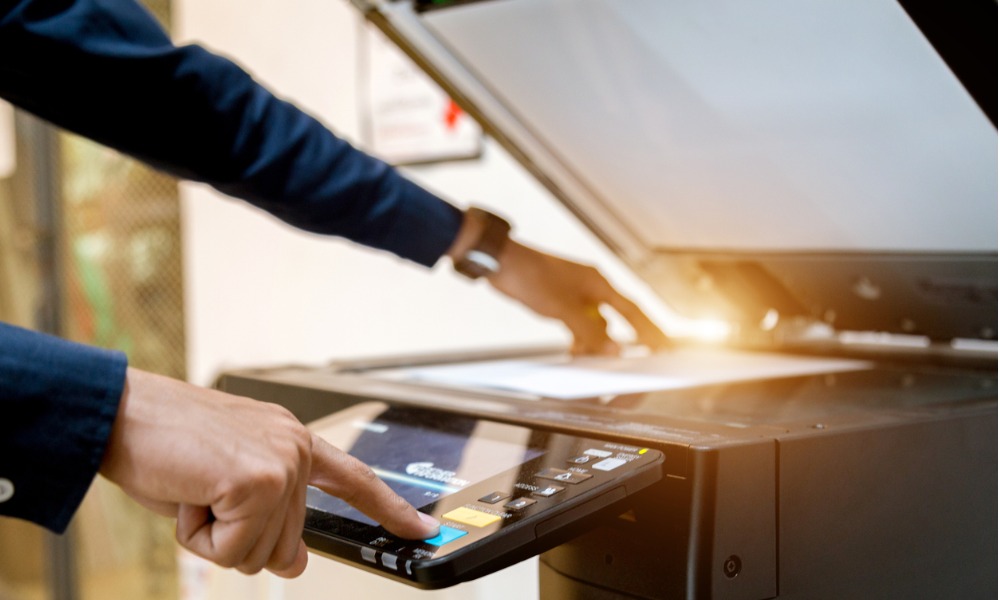With the rise in paperless offerings, some might think that the need for paper has diminished, but that’s not the case. Every day, many people still rely heavily on paper to conduct both personal and professional business. Because of this, every organization needs a good, reliable, and efficient office copier. Due to this need, companies must determine if they’re better served by buying or leasing a copier. Here are some factors to think about when weighing your decision.
Benefits of Leasing an Office Copier
Many small- to medium-sized businesses (SMBs) find that there are many advantages associated with leasing an office copier. Here are some of the benefits you’ll receive from leased equipment:
- Low Monthly Payment. Leasing equipment is a straightforward process. You get updated technology in exchange for one flat monthly fee that’s easy to budget for and predictable. There are no concerns about budgeting for the extra repair and maintenance expenses associated with ownership.
- No Capital Outlay. Paying for new equipment outright or by making payments is a huge expenditure. For some businesses, it makes sense, but for companies that have limited credit or cash reserves, leasing often turns out to be a better, more cost-efficient decision.
- No Down Payments. With leased equipment, you don’t have to make a substantial down payment. Once you and your vendor decide upon equipment and the terms, you sign the contract and budget in your monthly payments – it’s an easy process!
- Access to Updated Equipment. Companies that lease equipment enjoy their ability to receive more frequent upgrades to their copiers. Unlike buying, aging leased equipment can be swapped out for newer models.
- Less Maintenance. Most leased equipment comes with service and repairs included in the contract and negotiated price. Routine maintenance can be scheduled, and any repairs made immediately. Proactive maintenance included in one monthly payment results in fewer breakdowns and interruptions.
- Tax Advantages. When you lease office copiers, you can write payments off as business expenses. With purchases, you can only write off a certain amount on a depreciation schedule.
Before signing a lease contract, be sure to understand all of its terms. This includes prices associated with using color and black/white ink, the type of equipment you intend to lease, and any maintenance program that accompanies the lease. You want to be certain everything you expect is indeed included. If it isn’t, you should renegotiate terms before you sign.
Benefits of Buying an Office Copier
Equipment leasing has its advantages, but for some companies purchasing is a much more viable option. The following benefits are good ones to consider to help you to determine if buying an office copier is the better decision for your business.
- Simplicity. Buying equipment is a very straight forward process. Shop around, ask questions, buy what meets your needs.
- No Contracts. Once you purchase a copier, it’s yours; there are no contracts to negotiate or renew once you’ve purchased your equipment, and you aren’t locked into an agreement with a third-party vendor.
- Return on investment. While it’s true office equipment does depreciate in value, a well-cared-for machine can be sold off when it’s no longer needed, whereas a leased one has to be returned, and businesses don’t receive any ROI.
- Avoid interest rates. Cash payments for office copiers come with no extra fees or interest payments.
- Less expensive. Companies that have enough credit or cash on hand often prefer to own their equipment because it can be cheaper over the long-term. Once their copiers have outlived usefulness, they can sell them and use profits to upgrade to a newer device.
There is an appeal associated with owning assets, but it doesn’t make sense in every situation. Additionally, technology is continually updating. If you were to buy a copier outright, would that choice enable you to be able to keep up with the pace most businesses need to remain competitive in their respective markets?
Leasing or Buying Your Next Office Copier: Which is Best for Your Business?
If you’re wondering whether it’s more financially feasible to lease or buy, you aren’t alone. Thousands of SMBs face this dilemma. Before making a final decision, here are some questions to ask yourself.
- How many copiers will you need? The higher the volume, the more expensive to buy.
- How many people will be using your equipment?
- How much physical space will you need, and would you be better served by one multi-function piece or several standalone machines?
- Can your budget handle an additional monthly expense to accommodate a lease?
- How often will you need or want to upgrade?
Also, if you really want to own the equipment you’re using, many leases have a buyout option at the end of the contract. However, consider that technology often significantly changes every 24-48 months. So be sure to ask your vendor what happens after the lease and weigh your options carefully before you sign your next contract.
Whether to lease or buy a new office copier is a decision where there is no one-size-fits-all answer. Look at the pros and cons of each option and make a physical list if you need to see these choices laid out in front of you. To learn more about your options to buy or lease your next office copier, contact Hart Office Solutions today to find out more about the solutions we can offer your company.
